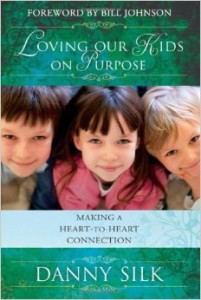
Just wrapped up Loving our Kids on Purpose, a fantastic book by Danny Silk. I was first introduced to Danny by listening to his teaching on “Culture of Honor”, which is really incredible and worth getting a hold of. The theme of that teaching bled through into this book: a culture of honor understands that a relationship is two powerful people having the ability to communicate and have their needs met. Loving your kids on purpose is an intentional effort to respect your child’s power in the relationship in order to nurture a heart connection.
“Fantastic” and “incredible” are big words to use for a book, but I feel that the concepts being communicated are so counter-intuitive from our predisposed I’m-the-parent-so-I-deserve-respect way of thinking, that the potential for revolutionized parent-child relationships is, indeed, incredible.
The premise of the book is a call away from a punishment-based mentality. Fear is opposed to love and punishment is about fear. Instead, Danny encourages parents to empower your children to encounter the consequences of their decisions — good or bad. Parents have a role to protect their child from life-threatening or long-term consequences, but through guiding questions and freedom, we introduce them to consequences and allow them to find that we are a wealth of wisdom that can save them from those consequences. So it’s not a power-play, but a display of power — their power — to make decisions.
Big takeaways from Loving our kids on purpose
- Every human is a powerful being; worthy of respect and capable of making decisions and enduring the consequences.
- Relationships operate in love and respect, not in power struggles. No one wins in “Red Truck, Yellow Truck.”
- Punishment breeds fear. Respect breeds trust and love.
- I cannot force my child to respect me through threats or power plays. By enabling them to be powerful, I show respect and earn theirs.
- My goal is not compliance, but to have a loving heart-connection with my child. This “kite string” of love will keep us connected, even when my child is at a distance, being blown in the freedom of adolescence and adulthood.
- When my child is free to choose, they are free to encounter the effects of those decisions.
- Children are smart. Instead of barking orders, I can present their problems to them so they can learn to engage their own brains in finding a solution.

